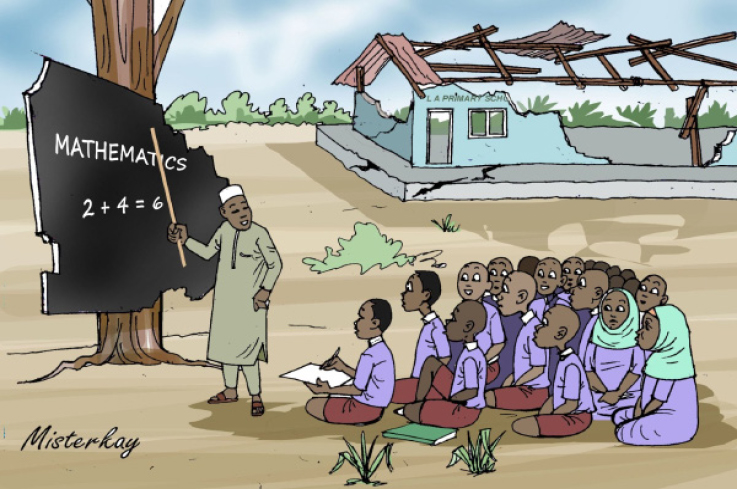This year’s World Teachers’ Day provided another opportunity for society to acknowledge and appreciate the invaluable contributions of teachers in their efforts to enlighten the minds of young people in their care.
This annual observance, established in 1994, commemorates the 1966 UNESCO/ILO recommendation on the status of teachers, which sets global standards for teachers’ rights, training, and working conditions.
Without doubt, teachers are significant contributors to the evolution of modern society – no doctor, engineer, lawyer, journalist, business executive, sportsperson, scientist, or top global leader in any field, including politics and governance, rose to their positions without teachers playing a role in their development at one point or another.
It is often said that very educated man or woman owes a debt of gratitude to their teachers
Even world figures like Bill Gates, Mark Zuckerberg, Richard Branson, Oprah Winfrey and Steve Jobs, who left the formal education system to achieve greatness, were at some point under the tutelage of teachers.
However, despite teachers’ central role in shaping society, they are rarely rewarded adequately for their work.
This year’s celebration carries special significance in Nigeria, where the teaching profession—from early childhood education to the university level—faces a series of persistent challenges that threaten its very foundation and, by extension, the country’s development.
The fortunes of teaching in Nigeria, especially at the primary and secondary levels, have long been in decline. These crucial stages, where the foundations are laid for character formation and academic excellence, have become a shadow of their former selves due to chronic underfunding and the abject working conditions of teachers.
Public schools have become an increasingly last resort for those who cannot afford private education. In contrast, private schools, being profit-driven, often lack the focus on instilling strict moral values and civic responsibility.
For decades, Nigerian universities have also been plagued by frequent industrial action by academic unions, notably the Academic Staff Union of Universities (ASUU) and their polytechnic counterpart, ASUP.
These strikes, often lasting weeks or even months, stem from longstanding grievances: poor salaries, inadequate funding, substandard working conditions, and the government’s failure to honour previously signed agreements.
As a result, students suffer from disrupted academic calendars, delayed graduations, and a generally unstable learning environment. The nation loses out on the timely development of a skilled workforce, which is essential for economic progress and innovation.
At the heart of these crises are the teachers—dedicated professionals who feel undervalued, unsupported, and overburdened by conditions that make effective teaching nearly impossible. Despite their critical role in shaping Nigeria’s future leaders, many lecturers earn salaries that do not reflect their qualifications or responsibilities. Their institutions often lack essential infrastructure, research funding, and resources.
The theme of this year’s World Teachers’ Day, “Recasting Teaching as a Collaborative Profession”, resonates strongly in the Nigerian context. It calls for a paradigm shift—from viewing educators as a lower-tier profession to recognising them as critical partners in national development.
To break the cycle of strikes and dissatisfaction, there must be meaningful collaboration between the government, educational authorities, and the teaching community. Policies should prioritise fair remuneration, sustained investment in infrastructure, and inclusive engagement of academic staff in decision-making processes.
Beyond financial and material concerns, teachers require environments that support their professional development, foster peer collaboration, and offer recognition.
No serious nation neglects its teachers. Education is a cornerstone of social and economic advancement. When teachers are demoralised and institutions fail, the quality of education declines, and students graduate ill-equipped for the demands of the modern world. This, in turn, diminishes Nigeria’s global competitiveness.
The Nigerian government must view education as a national priority, not merely a line item to be trimmed during times of economic strain. Investment in teachers is an investment in the country’s future. Proper funding, competitive salaries, modern facilities, and opportunities for research and career advancement will not only reduce the frequency of strikes but also attract young, talented individuals to the profession.
On this World Teachers’ Day, Nigerians should unite to honour the resilience, dedication, and passion of educators who continue to teach under challenging circumstances. They deserve more than symbolic appreciation—they deserve respect, recognition, and tangible support.
As Nigeria joins the rest of the world in marking World Teachers’ Day, our message as a newspaper is clear: teachers are the backbone of our education system and the architects of national development.
The recurring strikes and systemic issues affecting the educational sector must be addressed for the greater good of Nigerian society.
Beyond the usual well-scripted speeches by presidents, governors, and other officials eulogising the role of teachers, this occasion should be used to reassess their commitment to adequately funding education and improving the welfare of its professionals.
By recasting teaching as a respected and collaborative profession, Nigeria can build an education system that truly prepares its youth to meet the challenges of the 21st century and beyond.
Teachers’ reward should not be in heaven alone, but here on earth as well.





